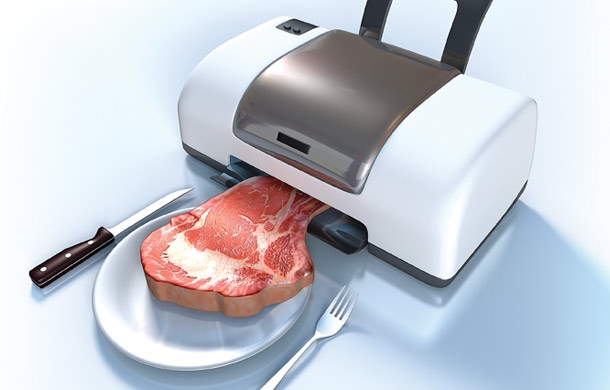Food, as we know it, is a favourite to the majority of human civilization and one of the strongest desires of a man. But since more than a decade there has been campaigns among organizations and people to ban animal slaughter. This has paved way for 3D printing technology for few years. 3D printing technology had, and is still continuing to have its notable implication in the food manufacting industry. Companies have invested in the food-based 3D printing as it’s apparently one booming area in 3D printing industry currently. Unfortunately not all the companies who’ve invested could continue with the face for much long. Makerbot, one of the ace 3D printing companies contributed to polymer-based 3D printing. Although 3D Systems, another leading 3D printing company, have taken a risk on investing in commercial kitchen although long-term impact of this kind of investment is not known.
However, there’s been a buzz in the 3D printing news when heir of Rockefeller has invested in Modern Meadows, a Brooklyn based company. Modern Meadows is responsible for manufacturing edible animal products without animal-slaughter. They manufacture synthetic meat using 3D printing technology.

Modern Meadows has a vision to introduce 3D printed meat to the masses, that will surely reduce animal slaughter. Their product – steak chip, has particularly got the attention of Justin Rockefeller, great-great-grandson of John D. Rockefeller, Founder of Stand Oil.
Justin Rockefeller says, “I have eaten a steak chip. It tasted like a salty steak chip. It was delicious.” Clearly, earning fandom of Mr. Rockefeller will give an impressive branding edge to Modern Meadows.
Modern Meadows creates animal tissues with the help of 3D printing technology. Using these animal tissues they made their own edible “steak chips”.
Tissue engineer and co-founder of Modern Meadows, Andras Forgacs, states manufacturing one single pound of edible steak chips costs thousands of dollars. However he hopes the price will drop once the production starts picking up. Andras has said that they are also trying their hands on creating artificially made animal leathers, which can be used for making wallets, car seats, etc.

Justin Rockefeller
Rockefeller said, “I would put this in the category of high-risk, high-return, high-impact,” He adds a inspiring thought, saying “Every major idea seems crazy at first. Even mobile telephones used to look like giant bricks and cost $5000 each in the early 90s, but visionary people imagined a world in which every single person on the planet has one of these mobile devices and they fit in your pocket.” True, isn’t it ?
Andras and his father Gabor Forgacs are also the founders of Organovo, which creates human tissues for testing and medical purposes.

A vehement researcher in the field of 3D printing of human tissue, Dr Tim Woodfield from Otago University said, “3D printing is a very exciting space and huge advances are likely in the next 10 or 20 years, however the research community remains somewhat skeptical because of the costs of engineering what may be an expensive or niche product.”
Feature Image courtesy: www.blogs.baruch.cuny.edu
